The Iconium Deception
![]() After being chased from the city of Antioch in Pisidia, Paul and Barnabas fled to Iconium and followed their pattern of first visiting the Jewish synagogue of the city. There they met with similar results as in Pisidian Antioch, with one important difference.
After being chased from the city of Antioch in Pisidia, Paul and Barnabas fled to Iconium and followed their pattern of first visiting the Jewish synagogue of the city. There they met with similar results as in Pisidian Antioch, with one important difference.
The Church at Antioch
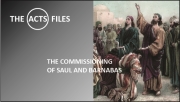 The first few verses of Acts 13 provide us a rare glimpse into the early church of Antioch. The first is that it had two official offices, namely teachers (pastors) and prophets. There is no indication that deacons or elders were yet appointed.
The first few verses of Acts 13 provide us a rare glimpse into the early church of Antioch. The first is that it had two official offices, namely teachers (pastors) and prophets. There is no indication that deacons or elders were yet appointed.
Peter's Escape
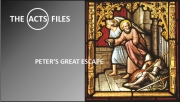 At the start of Acts 12 we are given a few details of the death of James, son of Zebedee. As the apostle John’s older brother he was one only three to witness Jesus’ transfiguration on the mount. James was one of the first disciples called by Jesus and the first to be martyred (Stephen was a deacon, and while he was a follower of Jesus was not one of the 12). His mother and father were people with means and owned a few fishing vessels. This is likely one reason Jesus asked John to care for his mother shortly before his death.
At the start of Acts 12 we are given a few details of the death of James, son of Zebedee. As the apostle John’s older brother he was one only three to witness Jesus’ transfiguration on the mount. James was one of the first disciples called by Jesus and the first to be martyred (Stephen was a deacon, and while he was a follower of Jesus was not one of the 12). His mother and father were people with means and owned a few fishing vessels. This is likely one reason Jesus asked John to care for his mother shortly before his death.
The Gospel Goes Global
 The history unfolding in Acts 10.1-11.18 reads simply enough, but is of great importance. There is far more to learn than a simple reading permits. Yes, Cornelius is visited by an Angel, and Peter receives a vision, the gospel is received by many and Peter squares it all with the other apostles in Jerusalem. What else is there to learn?
The history unfolding in Acts 10.1-11.18 reads simply enough, but is of great importance. There is far more to learn than a simple reading permits. Yes, Cornelius is visited by an Angel, and Peter receives a vision, the gospel is received by many and Peter squares it all with the other apostles in Jerusalem. What else is there to learn?
Paul at Pisidian Antioch
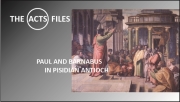 Acts 13.4 begins Saul’s, soon to be called Paul for the rest of the book, first of three missionary journeys. Why the name change? As we saw yesterday with John Mark, it is not unusual in the New Testament era for people to go by two names, one Hebrew the other Greek. Paul is the Greek equivalent of Saul. He and Barnabas are accompanied by John Mark to the island of Cyprus.
Acts 13.4 begins Saul’s, soon to be called Paul for the rest of the book, first of three missionary journeys. Why the name change? As we saw yesterday with John Mark, it is not unusual in the New Testament era for people to go by two names, one Hebrew the other Greek. Paul is the Greek equivalent of Saul. He and Barnabas are accompanied by John Mark to the island of Cyprus.
Truth and Consequence
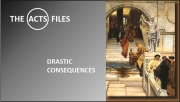 With Peter running from the law, Luke turns to the reaction of the authorities to Peter’s escape, and it’s not a pleasant one. The soldiers guarding Peter’s cell were the first to notice his absence. When word reached Herod he ordered a careful search for Peter and, when not found, ordered the execution of the guards. Four men died that day instead of Peter. Dismayed that his public spectacle could not proceed, Herod left town to reside at the palace in Caesarea-Maritima.
With Peter running from the law, Luke turns to the reaction of the authorities to Peter’s escape, and it’s not a pleasant one. The soldiers guarding Peter’s cell were the first to notice his absence. When word reached Herod he ordered a careful search for Peter and, when not found, ordered the execution of the guards. Four men died that day instead of Peter. Dismayed that his public spectacle could not proceed, Herod left town to reside at the palace in Caesarea-Maritima.
Prophets in Antioch
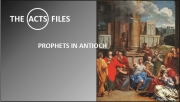 The events recorded in Acts 11.27-.30 is one of the most historically attested passages in the New Testament. There were many famines that rolled across the Roman Empire between 45 to 48 AD during the reign of Emperor Tiberius Claudius Nero Germanicus (known by all as simply "Claudius"). The famine referred to here was in the earlier part of that time frame and was mentioned by Josephus in his book Antiquities XX.
The events recorded in Acts 11.27-.30 is one of the most historically attested passages in the New Testament. There were many famines that rolled across the Roman Empire between 45 to 48 AD during the reign of Emperor Tiberius Claudius Nero Germanicus (known by all as simply "Claudius"). The famine referred to here was in the earlier part of that time frame and was mentioned by Josephus in his book Antiquities XX.
Question and Answer #1
 A few readers of this site wrote and asked if the Bible itself made a distinction between raing the dead and resurrecting the dead. Congratulations to them for thinking like Berean! In fact, the Bible does make such a distinction in the language it uses. The clearest distinction is found in Matthew 27.52-.53. I’ll quote the passage below replacing the English words with the Greek to illustrate the difference.
A few readers of this site wrote and asked if the Bible itself made a distinction between raing the dead and resurrecting the dead. Congratulations to them for thinking like Berean! In fact, the Bible does make such a distinction in the language it uses. The clearest distinction is found in Matthew 27.52-.53. I’ll quote the passage below replacing the English words with the Greek to illustrate the difference.
Paul and Elymas
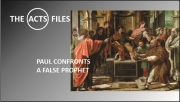 Acts 13.4 begins Saul’s, soon to be called Paul for the rest of the book, first of three missionary journeys. Why the name change? As we saw yesterday with John Mark, it is not unusual in the New Testament era for people to go by two names, one Hebrew the other Greek. Paul is the Greek equivalent of Saul. He and Barnabas are accompanied by John Mark to the island of Cyprus.
Acts 13.4 begins Saul’s, soon to be called Paul for the rest of the book, first of three missionary journeys. Why the name change? As we saw yesterday with John Mark, it is not unusual in the New Testament era for people to go by two names, one Hebrew the other Greek. Paul is the Greek equivalent of Saul. He and Barnabas are accompanied by John Mark to the island of Cyprus.
On the Lamb
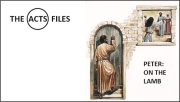 Once Peter realized his escape was for real he fled to the home of a friend, John Mark. Perhaps he fled there because it was close (most likely), or because he was aware of the prayer meeting happening there, either way it was a place of safety which he desperately needed.
Once Peter realized his escape was for real he fled to the home of a friend, John Mark. Perhaps he fled there because it was close (most likely), or because he was aware of the prayer meeting happening there, either way it was a place of safety which he desperately needed.
Mission Antioch
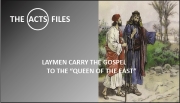 Due to the persecution that broke out over Stephen’s execution (chapter 7) many Jesus-following Jews left Jerusalem for friendlier shores. Some of those friendly shores included Phoenicia (a region north of Israel), Cyprus (a large island off the coast of Israel) and even as far north as Antioch in Syria.
Due to the persecution that broke out over Stephen’s execution (chapter 7) many Jesus-following Jews left Jerusalem for friendlier shores. Some of those friendly shores included Phoenicia (a region north of Israel), Cyprus (a large island off the coast of Israel) and even as far north as Antioch in Syria.
On Death, Part Two
 One of the most intriguing aspects of death is just how complex the whole thing is, and it could be even more complicated if we were to delve into what death was like before the resurrection of Jesus. So convoluted were some of the details, I found it easier to understand by diagramming just what can happen to a spirit on this side of the empty tomb.
One of the most intriguing aspects of death is just how complex the whole thing is, and it could be even more complicated if we were to delve into what death was like before the resurrection of Jesus. So convoluted were some of the details, I found it easier to understand by diagramming just what can happen to a spirit on this side of the empty tomb.
